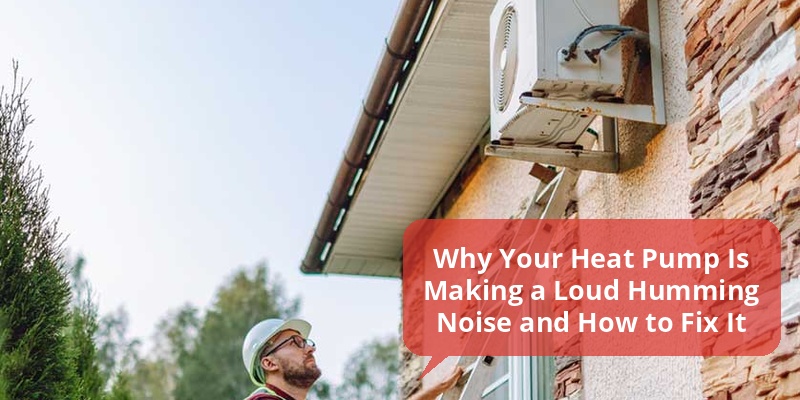Heat pumps are essential for efficient heating and cooling, but a loud humming noise can indicate potential issues that require prompt attention. This article explores the common causes of a loud humming noise coming from heat pumps and provides practical solutions for troubleshooting and repair. Whether it’s a homeowner or an HVAC professional in the United States, understanding these problems can help maintain system performance and avoid costly repairs.
| Cause | Symptoms | Recommended Action |
|---|---|---|
| Electrical Problems | Consistent humming sound, no heating/cooling | Check wiring and connections, call an electrician |
| Compressor Issues | Loud humming with vibration, reduced efficiency | Schedule professional compressor inspection |
| Fan Motor Problems | Humming with fan failure or noise | Lubricate motor or replace fan motor |
| Refrigerant Leaks | Humming combined with poor temperature control | Call technician to check refrigerant levels |
| Loose Parts | Intermittent humming noise | Tighten screws and panels |
Common Causes of a Loud Humming Noise in Heat Pumps
Electrical issues are often responsible for a persistent humming noise. Faulty wiring, loose connections, or a malfunctioning capacitor can create this sound without the unit properly operating. Regular electrical maintenance is vital to minimize such risks.
The compressor is another major source of humming noises. When compressors struggle or begin to fail, the motor inside produces a loud hum, often accompanied by vibration or overheating. Compressor problems require professional diagnosis due to their complexity and cost.
Fan motor problems can cause humming, too. If the motor is worn or bearings are failing, it results in abnormal noises. Proper lubrication or replacement of the fan motor parts can resolve this issue and restore smooth operation.
Refrigerant leaks may not directly cause humming but can lead to system inefficiencies accompanied by unusual noises. Low refrigerant pressures force the compressor to work harder, sometimes creating a humming sound.
Loose parts or panels inside or around the heat pump may vibrate and lead to humming noises. Regular tightening and inspection can prevent these mechanical noises and maintain system integrity.
Diagnosing the Source of the Humming Sound
Proper diagnosis is essential to address the root cause of a loud humming noise effectively. The following steps can help identify the source safely:
- Listen closely: Determine if the humming is continuous or intermittent and note any vibration or changes in system performance.
- Visual inspection: Check the exterior and interior components for loose screws, damaged wires, or signs of wear.
- Electrical testing: Use a multimeter to test capacitors and wiring connections; faulty readings indicate electrical faults.
- Check refrigerant levels: Low levels suggest leaks and necessitate professional recharging alongside leak repairs.
- Fan operation: Observe fan blades and motor condition during operation for irregular motion or sounds.
How to Fix a Loud Humming Heat Pump
Once the cause of the loud humming is identified, appropriate action follows. Some fixes can be handled by homeowners, while others require licensed HVAC professionals:
Electrical Repairs
Turn off power before inspecting wires or capacitors. Tighten loose connections or replace failing capacitors. For complex electrical faults, calling a licensed electrician is safer and more effective.
Compressor Issues
Compressor repairs or replacement are intricate tasks requiring professionals. If humming is due to compressor failure, seek expert service immediately to prevent complete system breakdown.
Fan Motor Maintenance
Apply proper lubrication to fan motor bearings or replace the motor if worn out. Clean fan blades to ensure smooth rotation and reduce noise from imbalance.
Addressing Refrigerant Leaks
Repair leaks promptly to maintain correct refrigerant charge and optimal heat pump function. Professionals will detect leaks and recharge the system safely.
Securing Loose Parts
Check and tighten all screws, bolts, and panels around the heat pump system. Reducing vibration often eliminates humming noises caused by loose components.
Preventive Measures to Avoid Heat Pump Noise Issues
Regular maintenance is critical for quiet and efficient heat pump operation. Schedule seasonal HVAC inspections to catch potential issues before they worsen.
Keep the area around the heat pump clean and free from debris that could interfere with fans or cause vibrations.
Lubricate moving parts annually to reduce friction noise.
Check electrical components periodically and replace worn-out capacitors and wires.
Ensure refrigerant levels remain optimal by having professionals perform leak detection and system servicing regularly.
When to Call a Professional Heat Pump Technician
If the loud humming noise persists after basic troubleshooting or is accompanied by:
- Heating or cooling failure,
- Burning smells or electrical odors,
- Excessive vibration or overheating,
- Unusual system shut-offs,
it is important to contact a certified HVAC technician. Specialized tools, experience, and knowledge are required for safe and lasting repairs on complex systems.
Cost Implications of Fixing a Loud Humming Heat Pump
| Issue | Estimated Repair Cost | Typical Repair Time |
|---|---|---|
| Capacitor Replacement | $100 – $250 | 1-2 hours |
| Fan Motor Repair/Replacement | $150 – $400 | 2-4 hours |
| Refrigerant Leak Repair | $200 – $600 | 2-3 hours |
| Compressor Repair/Replacement | $1,200 – $2,800+ | 4-8 hours |
| Electrical Wiring Fixes | $100 – $500 | 1-3 hours |
Costs vary depending on geographic location, the heat pump model, and the technician’s rates. Early diagnosis reduces repair expenses and prevents more severe damage.
